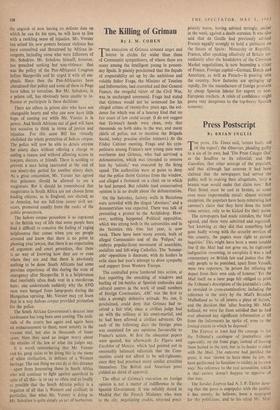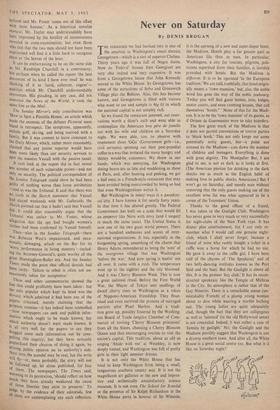Press Postscript
I3.■ BRIAN INGLIS THE press, The Times said, `conies badly out of the report'; the Observer, pleading guilty to a sin of its own, had `The Press Caught Out' as the headline to its editorial; and the Guardian, that other scourge of the populars, said that although last summer it had beCn claimed that the newspapers had served the public well in making their allegations, 'only a brazen man would make that claim now.' But Fleet Street must be cast in bronze, or some even more impermeable metal: almost without exception, the populars have been reiterating last summer's claim that they have done the State some service, only to be kicked for their pains.
The newspapers had made mistakes, the Mail agreed, and these were admitted and regretted; `but knowing as they did that something had gone badly wrong with the security services of this country, the papers were right to pursue inquiries.' This might have been a more tenable line if the Mail had not gone on, its righteous indignation mounting, to complain it Was a sad commentary on British law and justice that the only people to be punished, apart from Vassal', were two reporters, `in prison for refusing to depart from their own code of honour.' Yet the Mail itself on a later page felt obliged to print the Tribunal's description of the journalist's code, as revealed in cross-examination; including the reference to the story by the Mail's Brendan Mulholland as 'to all intents a piece of fiction,' and 'the decision that `after hearing Mr. Mul- holland, we were far from satisfied that he had ever obtained any significant information at all from the informants he spoke of, even to the limited extent to which he deposed.'
The Express at least had the courage to list the Tribunal's catalogue of journalistic sins separately, on the front page, instead of leaving them buried in the text; but in its leader it sided with the Mail. The outcome had justified the press; it was 'shown to have done its job, to have performed its function to society in its own way.' No reference to the real accusation, which is that society doesn't happen to approve of that way.
The Sunday Express had A. J. P. Taylor deny- ing that the press is unpopular with the public; it has merely, he believes, been a scapegoat for the politicians, and to his mind Mr. Mul- holland and Mr. Foster `come out of this affair with most honour.' As a historical novelist nutrique, Mr. Taylor may understandably have been impressed by the fertility of inventiveness revealed in cross-examination; but even those who feel that the two men should not have been imprisoned will find it a little hard to recognise them as 'the heroes of the hour.'
It can be embarrassing to be on the same side as Mr. Randolph Churchill in a controversy; but perhaps when he called the report 'the best document of its kind I have ever read' he was thinking of it as 'lucid, coherent, cogent'— qualities which Mr. Churchill understandably reverences. His pleading, in any case, did not convince the News of the World; it took the same line as the Mail.
The Sunday Mirror's only contribution was How to Spot a Possible Homo,' an article which made the excesses of the defunct Pictorial seem bland in retrospect. The symptoms, apparently, include golf, ski-ing, and being married with a family. But it was content to leave comment to the Daily Mirror, which, rather more reasonably, claimed that any junior reporter would have been more likely than our security services to spot the massive Vassall with the passive tassel.
A cool look at the report did in fact reveal any number of such vulnerable points—and not only on security. The political correspondent of the Sunday Telegraph could show he had been guilty of nothing worse than loose attribution —and so was the Tribunal. It said that there was no truth in the Sketch statement that Vassall had stayed weekends with Mr. Galbraith; the Sketch pointed out that it hadn't said that Vassal! did. It could also reasonably argue that the Tribunal was unfair to Mr. Foster, whose allegation that the spy had bought women's clothes had been confirmed by. Vassall himself.
Then—also in the Sunday Telegraph—there was Rebecca West's impassioned, and occa- sionally damaging, attack on the Bar for its `worst performance in living memory'—includ- ing the Attorney-General's, quite worthy of the great Manningham-Buller era. And the Sunday Times made the point that official denials had been tardy: 'failure to rebut is often not un- reasonably taken for acceptance.' These and other commentaries showed the line that could profitably have been taken: but the only popular which kept its head was the Herald which admitted it had been one of the Papers criticised, merely claiming that the Problem remains—it has indeed been intensified —how newspapers can seek and publish infor- mation which ought to be made known, but which authority doesn't want made known. It is all very well for the papers to say they dragged some such information out by com- Pelling this inquiry; but they have seriously jeopardised their chances of doing it again, by driving public opinion on to authority's side. Next time the scandal may be real, but the writs will flY—or, more probably, the story will not be followed up, let alone published, for fear of them. The newspapers, The Times said, warming to its peroration, 'should reflect on how much they have already weakened the cause of those liberties they exist to preserve.' To judge by the evidence of their editorials, few of them are contemplating any such reflection.







































 Previous page
Previous page